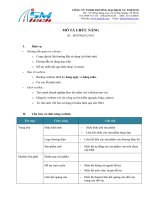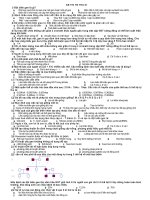Cấu trúc prefer, would prefer, would rather
Bạn đang xem bản rút gọn của tài liệu. Xem và tải ngay bản đầy đủ của tài liệu tại đây (82.49 KB, 2 trang )
Prefer, would rather, would prefer
1. Prefer to do và prefer doing
Thường bạn có thể dùng “prefer to (do)” hoặc “prefer -ing” để diễn tả bạn
thích điều gì đó hơn nói chung:
Eg: I don’t like cities. I prefer to live in the country
(hoặc) I prefer living in the country.
1.1 I prefer + N + to + N
I prefer this coat to the coat you were wearing yesterday.
1.2 I prefer+ V-ing + to + V-ing
I prefer driving to travelling by train.
1.3 I prefer + to V + rather than + (V
bare
) /something else.
I prefer to drive rather than travel by train.
Ann prefers to live in the country rather than (live) in a city.
2. Would prefer (I’d prefer )
Chúng ta dùng “Would prefer” để nói tới điều ta muốn làm trong một tình
huống cụ thể nào đó (không phải chung chung):
“Would you prefer tea or coffee?” “Coffee, please.”
Ta nói “Would prefer+ to V” (không phải V-ing):
“Shall we go by train?” “Well, I’d prefer to go by car.” (không nói 'going')
I’d prefer to stay at home tonight rather than go to the cinema.
3. Would rather (I’d rather )
Would rather (do) = would prefer (to do). Sau would rather chúng ta dùng
những động từ nguyên mẫu không có to. Hãy so sánh;
“Shall we go by train?” - “Well, I’d prefer to go by car.”
- “Well, I’d rather go by car.” (không nói "to go")
Câu phủ định là I’d rather not (do something):
I’m tired. I’d rather not to go out this evening, if you don’t mind.
Prefer, would rather, would prefer
“Do you want to go out this evening?” “I’d rather not.”
Chú ý mẫu câu với would rather:
I’d rather do something than (do) something else
I’d rather stay at home tonight than go to the cinema.
4. I'd rather you did something.
Khi bạn muốn người khác làm một điều gì đó bạn có thể nói “I’d rather you
did something”:
“Shall I stay here?” “I’d rather you came with us.”
“Shall I tell them the news?” “No, I’d rather they didn’t know.”
“Shall I tell them or would you rather they didn’t know?”
Trong cấu trúc này chúng ta dùng thì quá khứ (came, did v.v ) nhưng ý
nghĩa lại là hiện tại hoặc tương lai, chứ không phải quá khứ. Hãy so sánh:
I’d rather cook the dinner now.
Nhưng
I’d rather you cooked the dinner now. (không nói 'I'd rather you cook')
Dạng phủ định là “I’d rather you didn’t ”:
I’d rather you didn’t tell anyone what I said.
“Do you mind if I smoke?” “I’d rather you didn’t.”









